Reading List Hackday, Cambridge
Reading lists are an essential part of University life. Few undergraduate or postgraduate courses could operate without them and thousands and thousands are generated every term.
Reading lists can have a huge impact on achievements within institutions – a good reading list for a module on a course can make all the difference when it comes to obtaining the best degree. They can work wonders for the prestige of an institution and individual academics – a very good way to gain citations is to have your works recommended. They can also have a significant impact on budgets: libraries often first find out which new books they need to buy when they get a reading list from an academic.
Yet while they are useful, reading lists can also be problematic. They have the potential to give libraries fantastic information about what books are being used (and which aren’t) and so guide future purchasing policies, but few are working as well as they might. Inefficiencies within existing systems and problems within the three way communication process between libraries, academics and students have the potential to cost the education sector millions of pounds every year. And that’s not to mention the academic problems and frustrations that arise when books are inaccessible. Certainly, it’s a subject worthy of serious investigation – which the 2010 Reading Lists Hackday set out to provide. The organisers hoped that the event would also serve as a useful template for potential future events around other topics.

For hundreds of years Cambridge colleges have got the best out of students and academics by placing them in close proximity to each other, encouraging them to exchange ideas over the dining table as well as the more formal surroundings of lecture theatres and seminar rooms, and making them to work damn hard. The Reading Lists Hackday which took place on July 22 and 23 in the Moller Centre, in the grounds of Churchill College Cambridge, operated on the same principles.
For those that haven’t experienced the uniquely intense and creative atmosphere of a hackday, a brief explanation:
A hackday does all the important work of a normal conference. It’s an opportunity for developers, and professionals to break out of their usual surroundings and see what lies beyond the parapets of the office environment. It provides a place where ideas can be shared and colleagues can be brought up to date on recent developments and projects within the field. It’s an opportunity to make valuable contacts that will save time and money in the future.
Cristina Irving and Alan Glasspool from Emerald Publishing on the networking benefits of hackday
A hackday also provides an environment in which real practical work is done: in terms of coming up with solutions for technical problems, in terms of thinking up new ideas and ways to deliver better services and, in terms of the distribution of knowledge, expertise and even (at least in the case of this event) memory sticks full of code.
Ben O’Steen explains a benefit of the hackday environment.
So, hackdays are events in which a lot of work is done. Indeed, plenty had been achieved even before things started in Cambridge, with the establishment of an email list to discuss and highlight related issues. During his introduction to the event, hackday organiser Mahendra Mahey put up a slide of the main areas for improvement discussed on the list. These included:
- Questions about the interoperability of different reading list systems to other systems such as Library Management Systems.
- Debates about the intended purpose and usefulness of reading lists, how much students use some of them and how well they could work as a purchasing and collection management tool.
- The possibility of integrating lists and social networking.
- How to maintain reliable stable links and keep lists up to date.
- Duplication of effort (i.e. how to avoid the need to input information from a word doc, for example, onto another reading list system).
- Metadata magic (i.e. ways to generate rich information from single sources such as ISBNs).
- Prediction of demand of resources (e.g. impact of estimated class sizes etc for library and bookshop).
- How to extend the content on lists to include multimedia.
- How to track usage patterns, generate stats from lists and work out what students actually use. (With particular interest generated by the way students like to be able to find out what their predecessors who gained firsts had been reading…)
- Tools to aid communication between academics and the library.
- Marketing tool for libraries – i.e. promoting collections, recruitment tools for prospective students.
- A debate about the desirability of uniform standards for creating lists.
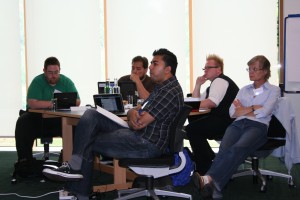 Delegates watch a presentation
Delegates watch a presentation
Importantly, however, this was an event about solutions as much as problems. Before the serious work of hacking began, a number of delegates gave brief presentations on the projects they have been working on:
Telstar
Introduced by Owen Stephens and Jason Platts, Telstar is a project looking at how to integrate academic referencing into the Open University’s learning environment (which is based on open source moodle software). It offers high levels of automation and time saving tools to make entering references (and potentially, by extension reading list citations) easier. There’s a nifty demo of the project available here.
Owen Stephens
Jason Platts
List8D
Ben Charlton and Matthew Spence gave the next talk on List8d, a project currently in development (started with JISC funding, and which Kent University now supports) intended to help with reading list management. It is designed to user friendly and will communicate with many platforms (such as voyager, amazon and google books), allows multiple searches, will organise metadata according to user-specified hierarchies, and has the ability to allow academics to send instructions to librarians (e.g. “this is an important text, please buy 100″). They also introduced the concept of the ‘metatron’ – a piece of code that enables List8d to connect to other systems, especially for providing items for a Reading List. Unfortunately, there was a technical fault with the camera and the alternative produced pretty poor quality video, so we have decided not to include it.
Talis Aspire
Chris Clarke talked about Talis Aspire, a resource list management service, and how to use collective intelligence to improve software and services. Chris said that academic engagement is key in the management of library resources – and in order to persuade academics to engage with a system, that system has to be as easy as possible to use, and useful to them. He also brought up some interesting ideas that they have been working on relating to collective intelligence. The experience of mining data from Talis Apsire customers suggests that there seems to be real potential in using masses of data to discover patterns relating to what students actually borrow (as opposed to what they are simply told to borrow). It would be possible, for instance, to provide recommendations for further reading based on borrowing patterns – and about avoiding the purchase of books that no one actually reads.
Mendeley
Ian Mulvany introduced Mendely, which has been described as a kind of Last FM for research papers (unsurprisingly, since the creators of Mendeley also created Last FM. It helps users to organise their papers, automatically generates bibliographies, allows sharing within groups and generates information about – say- which articles are read most frequently. It’s 16 months old, has 400,000 users, and real-time data on 28million research papers They’re currently developing their API and Ian said he hoped: “to find out if there are things within it we can make more useful for you. And what do you think is cool?” He then took the brave step of doing some live hacking of Mendeley using YQL (Yahoo Query Language).
Emerald
Cristina Irving and Alan Glasspool spoke about Emerald Reference, a product the publisher is developing as a free of charge service designed to help create peer reviewed reading lists, including, interestingly, lists reviewed by students. They hope it will improve workflow and offer a level of quality assurance not always present on reading lists drawn up by disinterested academics. They said that they only wanted to be one of such content providers and were pioneering the product as a service institutions.
Dawsoncenter.com
Finally, Heather Sherman from Dawson’s spoke about the ‘reading list’ funcitonality in the dawsonenter application, which allows items to be added to reading lists from Dawson’s database of bibliographic records (relating to books and ebooks), and then turned into orders directly – without the need to re-key data.
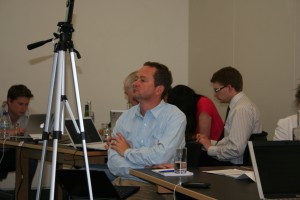
Even while the presentations were going on and before the hacking began, useful links were being forged. It became clear from the presentations for instance that worries several delegates had about citations had already been tackled by others. And so a lot of time, effort, worry and money was immediately saved – as John Salter from Leeds University explains:
John Salter on the benefits of sharing the pain
However, “the real work”, as many attendees termed it, began after 5pm. Delegates each wrote on post it notes what they saw important issues that had arisen on the day, as well as ideas offering interesting potential:
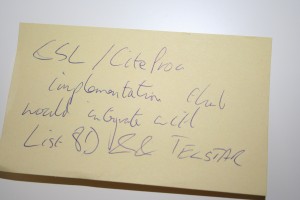
These were then stuck to a wall…
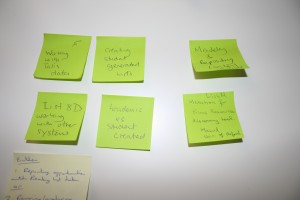
… and re-organised into relevant groupings.
These were:
1. Feedback and quality control issues
2. Repositories
3. Mendeley
4. Interoperability
5, “Random”
6. Purchasing and Usage
7. Styling
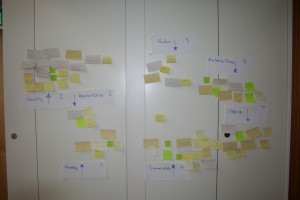
… Delegates mulled them over…
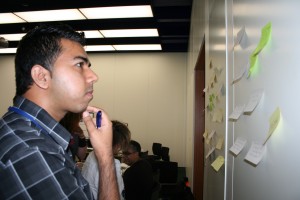
… decided which areas they were interested in and split up into teams (generally containing at least one non-developer alongside developers)…
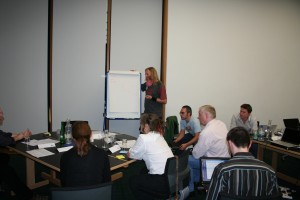
… each team started working through the post-it notes related to the theme they had chosen and began to thrash out ideas…
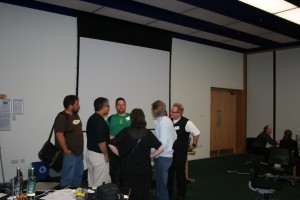
… working deep into the night.
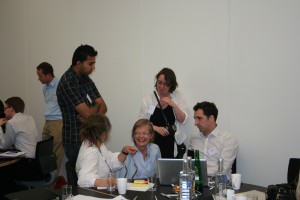
To someone unaccustomed to hackdays (like myself) the intensity of the work was striking – as was the solidity of the results that the various groups produced. By the middle of the afternoon on Friday, less than 24 hours after discussions about potential ideas had begun, a large number of projects were presented to the conference.
Two non-developers (Mark Jones and Cristina Irving), working in a group dealing with ideas about feedback about reading lists and using reading lists to improve communication between academics and librarians, had managed to upload data from Emerald’s RSS feeds into yahoo pipes, building up a database that could be developed to provide academics with a useful list of feeds and articles.
Ben Charlton gave a demonstration of a metatron which searches and retrieves results from kittenwar.com to show how easy it is to create the necessary code. More seriously, alongside all the data about Miss Princess Lady Meow Meow and co, he also demonstrated a metatron querying Kent’s Eprints Repository. This found journal articles written by Kent academics, but published in journals that Kent doesn’t have a subscription to – as Ben explains here:
Next, Ben O’Steen presented an idea called the 6 degrees of Harry Potter, designed to check through borrowing records to prove that almost every book borrowed from an institutional library is likely to be only six steps away from one of the books in the Harry Potter series. He devised a programme that checked through the ISBNs of Harry Potter books and then began to find related items, then items related to those and so on, as explained on Ben’s blog. The idea sounds frivolous, and won plenty of laughs from the delegates at hackday, but it potentially has serious and useful applications, as Ben himself suggests here:
Then, speaking on behalf of a group that had tackled the post-its related to styling issues and purchasing and usage, Jason Platts from The Open University demonstrated a programme designed to teach students how to write references by giving them forms to fill in and generating various styles as they do so.
Owen Stephens and John Salter, meanwhile, demonstrated a programme that used availability data from library catalogues to drive the acquisitions process. The idea is that when a student looks at a book that isn’t available within the library catalogue (generally because it is already out on loan) a notification of the problem is sent to library staff. At the same time, alternative methods of access are offered to the student, such as buying ebooks, or looking for copies in other libraries.
Owen Stephens explains his projects
Matt Spence then showed off a programme that helped users swap around between citation styles (i.e. from Harvard to Chicago style) and another attractive demonstration of interoperability using the Talis API in List8d.
Last but not least, Chris Clarke from Talis introduced a project aiming to take a reading list, draw out the unique identifiers and re-order the list based on social data drawn from several sources. That’s to say, it mashes data from as many places as possible (such as Open Library, Talis Aspire, Google books for ISBN, and PLOS and Mendeley) to create a google gadget that takes a reading list and re-orders it based on popularity, how many loans have been made and similar. Chris said his team had had “mixed results” when it came to gathering data and finishing the gadget, but the concept well on the way to success and the group have already established a domain name and set up a website explaining the concept further.
There’s no doubt that the above makes for an impressive roster of ideas and outcomes, but, of course, these projects only tell half the story of the conference. As Angie Donoghue from Sheffield Hallam University suggests here, a great many of the benefits of hackday relate to other intangibles like the contacts forged, questions answered and concepts explained:
These were sentiments I heard repeated often, alongside general satisfaction with the way the conference had unfolded. No one wanted to claim that the reading lists hackday wasn’t hard work , but for that reason it was also thought all the more rewarding and enjoyable. It was, in short, time well spent.
The success of the event also promises great things for the future. DevCSI will be bringing many more stakeholders, problem solvers and innovators together in the near future. Watch this space!








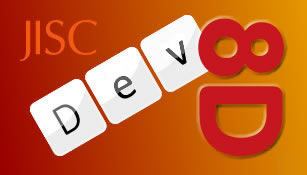

0 Comments
Trackbacks/Pingbacks